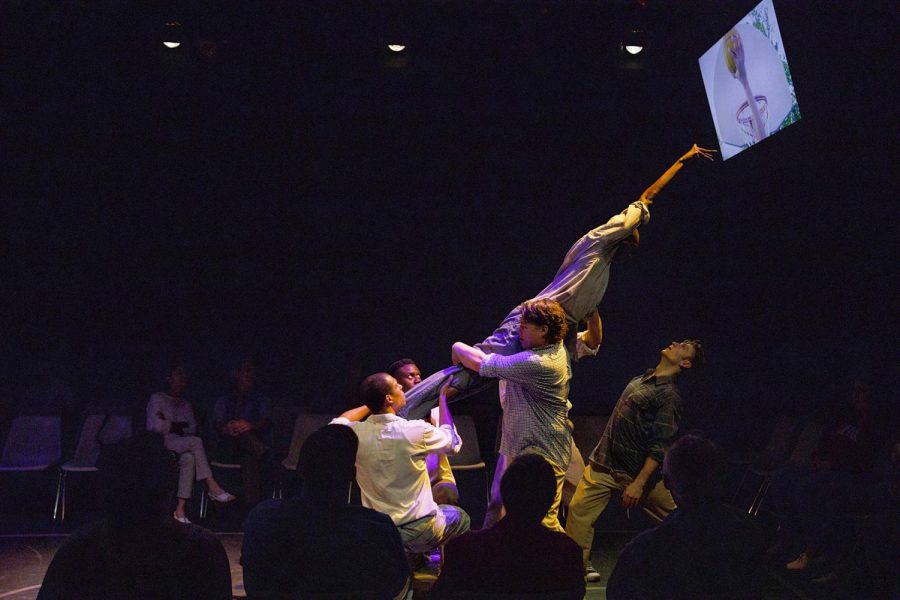Review: UA play brings past to present day
August 30, 2018
“Separate and Equal,” a play written by two UA professors, debuted at the Marian Gallaway Theatre on Tuesday, Aug. 28. The play, which West Alabama residents can view before its premiere in NYC, challenges the audience’s comfortability with its intimate atmosphere and dauntless approach to modern and historical racial inequality.
This week at the Marian Gallaway Theatre, “Separate and Equal” demonstrates Alabama’s place in national discourse. The production examines race relations in the Jim Crow South through the lens of a pick-up basketball game.
The play’s premise and choice of setting give it the ability to draw connections to our present society with historical allegory. Given the charged political and cultural climate surrounding young people and their role in the world, the preview presents an integral opportunity for UA students. This play serves as a special preview for West Alabama residents before it heads to New York City for its premiere at 59E59 Theaters.
On opening night, it was clear the performance was an intimate affair. The audience was set up in rows of chairs on the stage in a rectangle, surrounding a miniature basketball court. Small television screens hung at opposite ends of the court, representing backboards. The chairs line-up right to the out-of-bounds line, leaving no distance – physical or emotional – from the actors.
The setting is Birmingham, 1951. Worlds collide when three black teens encounter white students on a segregated basketball court. When the trash talk starts, they begin an illegal pickup game that carries the action of the play.
What strikes the viewer in the game is the movement. With no ball, the action is conveyed through clapped hands for possession and an animation for shots on the television backboards. This imaginative take allows the audience to understand the game. The rhythm and physical control in the movements of the actors makes the game easy to follow.
“I have collaborated with modern dance choreographer Lawrence Jackson to turn the basketball game within the play into a more emotive expression,” writer and director Seth Panitch said. “Then I added the musical accompaniment of renowned jazz guitarist Tom Wolfe, who scored the entire production.”
Tensions rise between the players, punctuating the game with altercations. The situation quickly turns violent when one of the white boys pulls a knife on the other team when fouled and again when two of the students give an impassioned and bone-chilling defense of the KKK.
When characters are confronted with a particularly tough choice during these arguments, Panitch employs flashbacks. One actor remains standing while the others kneel and freeze, and we are shown their backstory. Parents and other adults come onstage in small scenes of dialogue that underscore the cultural background of the game.
“I thought it was really original they showed us some of the formative experiences early in their lives that gave them the beliefs and inclinations they had,” said Alaric Rohl, a junior majoring in math and theatre. “It was a really poignant way to depict the origins of racial tensions.”
This is not all to say that “Separate and Equal” is a stark drama. Humor is sprinkled in, further humanizing both teams.
“We felt we needed the humor to help people get through it, so they weren’t just swimming in this very serious message,” said Dominic Yeager, general manager of “Separate and Equal” and director of arts management at The University of Alabama. “We thought it was important for the audience to laugh and feel more comfortable at times.”
The humor conflicts with the realization that these characters are just kids– young black kids forced to resist the oppression at the hands of their peers. Their daily lives toe a fine line between the innocence of childhood and the segregation of adulthood.
Ultimately, the show devolves into chaos when Lt. Connor arrives. Finding the scene unacceptably integrated, he tears the game apart. Here we are given a representation of the old ways impeding the new. In the show, when the youth have made progress through open-mindedness, their elders often remind them of the way things are “supposed to be,” with tragic results for everyone involved.
With the flashbacks, the humor and the game itself, “Separate and Equal” weaves a complex narrative for its audience. The multifaceted characters depict a confusing, unkind reality whose consequences we deal with today. Common sayings from our modern political climate can be easily picked out among the dialogue.
The play isn’t subtle; it isn’t clean; and it isn’t prettied up for history’s sake. There are no answers given, and there are no happy endings that we do not create ourselves. You will leave this play feeling challenged and unsure because there is no easy solution.
The show runs Tuesday, Aug. 28 through Friday, Aug. 31, with all shows beginning at 7:30 p.m. For tickets visit ua.tix.com.





















